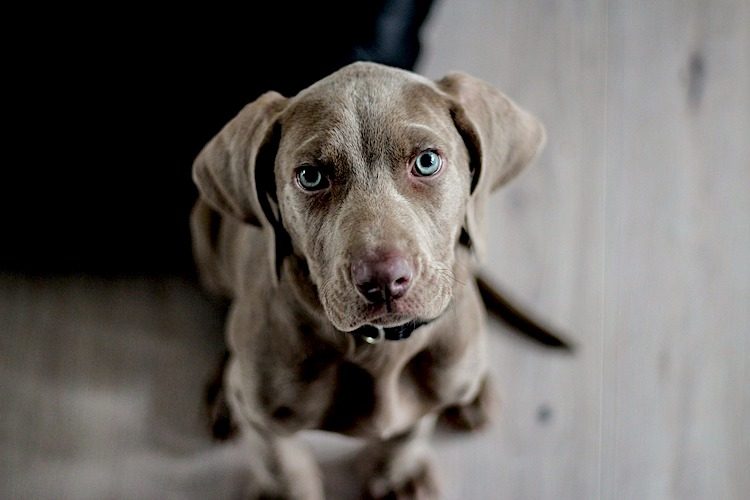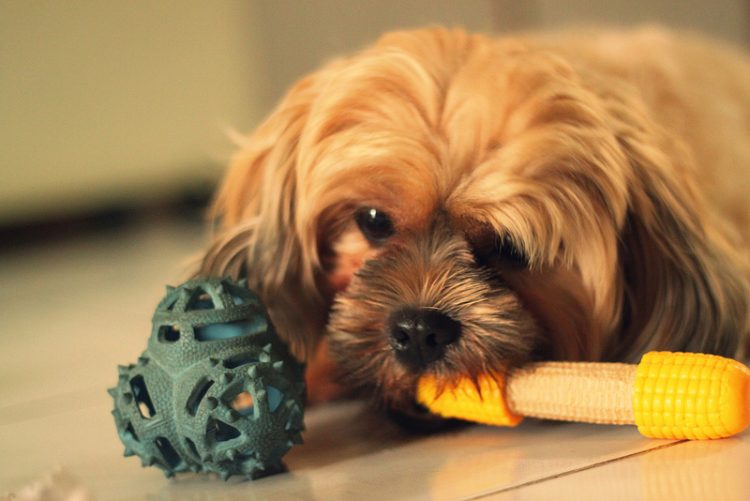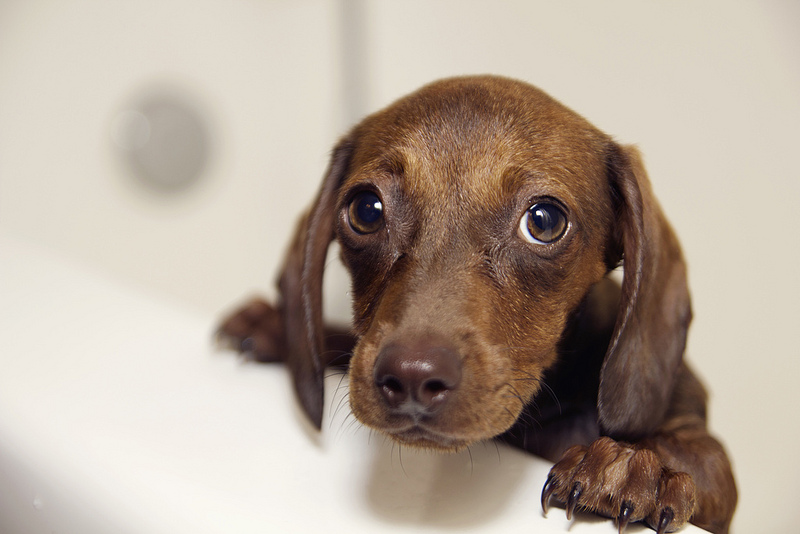
On a scale of 0 to 10, how hard is raising a new puppy?
Honestly — when 10 is “What have we done?” there are times when most people will score their new puppy at an 11. Like when there’s a puppy crying at night.
My heart goes out to a reader named Jenny, who recently asked a question about this. The good news is that things do get easier, and hard work early pays off later. As so many of my clients say to me, “It’s like having a new baby” — and they’re right.
So for all those people out there with a new puppy who are waking up (or not getting to sleep in the first place) to the reality of the patter of tiny paws, here are this veterinarian’s thoughts on what to do when things go wrong at night.
Puppy Crying at Night for Attention
Jenny’s cry for help concerned her 10-week-old Labrador Retriever, Stanley.
He’d go to bed at 10 p.m. and sleep till 5 a.m., when he’d scream — and wouldn’t stop. Even after a toilet break, he refused to settle and would cry … and cry and cry.
Jenny was using a crate and doing the right thing by ignoring him and not opening the door while the puppy was whining. But he went on and on for 4 hours straight (with a brief comfort break).
Now, she feels he can’t be left, and having a puppy is no longer a joy. Let’s see what we can do to help.

Crate Training 101
Stanley’s mom is crate training correctly, but let’s whizz through a few basics:
- Place the crate where the dog can see what’s going on but rest peacefully, such as the corner of a living room.
- In the crate have a comfy bed, chew toy and bowl of water.
- Partially cover the crate to make it cave-like.
- Seed the crate with kibble or treats so the pup thinks it’s an ace place.
- Never use the crate for punishment.
What else can we do? Plenty — keep reading.
Be Aware of “Extinction Burst” Behavior
You have to ignore a crying puppy — or else you’ll end up rewarding the bad behavior. Then they learn: Crying + Mom gives me attention = Crying works to get Mom’s attention.
Then, when you start to correct the puppy’s crying by ignoring them, they’ll think you haven’t heard — and just cry harder.
When a puppy cries and the problem gets worse, this is called an extinction burst. Unfortunately for you, the puppy will put a lot of effort in and will:
- Cry very loudly
- Or keep the performance up for several days
Don’t be discouraged. Keep going.

6 Tips for a Puppy Crying at Night
Don’t tear your hair out — have a plan instead.
Here are some suggestions:
1. Teach the puppy to love their own company.
Leave them alone in a room at times during the day (immediately after they’ve gone to the toilet, to avoid accidents) to get used to time on their own.
Was YOUR Pet Food Recalled?
Check Now: Blue Buffalo • Science Diet • Purina • Wellness • 4health • Canine Carry Outs • Friskies • Taste of the Wild • See 200+ more brands…

2. Set a routine.
Make sure your puppy is tired at bedtime by playing during the evening. Take them out for a comfort break and then into the crate and say, “Sleep time,” then leave the room.
3. Toilet breaks.
How long can a puppy go without peeing? A puppy can hold their bladder for 1 hour for each 1 month of age (up to 6 months).
- So a 3-month-old puppy can hold it for 3 hours — slightly longer at night.
- A 4-month-old puppy can hold it for about 4 hours.
- A 6-month-old puppy can hold it for 6 hours.
If your 3- or 4-month-old puppy goes to bed at 10 p.m., wake them at 1 or 2 a.m. for a toilet break, then again at 4 or 5 a.m.
4. Nighttime toilet stops.
The trick is not to make a fuss. Don’t talk to your puppy. Don’t turn the lights on.
Lift the puppy out of bed, carry them to a toilet spot, let them do their business, then put them straight back in the crate without a word.
This helps your puppy understand this is sleep time — not playtime. Ignore the whining between these stops because you know they don’t need the toilet. Invest in ear plugs, if necessary. Seriously.
5. Help them comfort themselves.
Teach your puppy to love chew toys. Do this by forgetting about feeding from a bowl and instead stuff the puppy’s food into a feeder chew toy (such as the awesome KONG).
Offer the KONG in the crate so your puppy gets used to chewing there.
Leave a dog-safe chew toy in with them at night so they turn to chewing for comfort.
6. Consider an Adaptil diffuser.
Plug in an Adaptil diffuser near the puppy’s bed. This gives off the same pheromone as a nursing dog mom and helps the puppy feel safe and secure so they drift off to sleep, instead of the puppy crying at night.
Sweet dreams, everyone!
 This article was written by a veterinarian, Dr. Pippa Elliott, BVMS, MRCVS. It was originally published in 2016 and is regularly updated. It was last reviewed for accuracy and updated April 4, 2022.
This article was written by a veterinarian, Dr. Pippa Elliott, BVMS, MRCVS. It was originally published in 2016 and is regularly updated. It was last reviewed for accuracy and updated April 4, 2022. 

